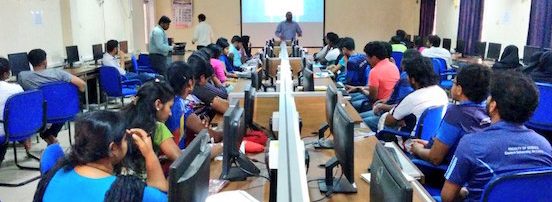
So far in this series, we’ve talked with some of the technical founders and advisors of the Internet in Sri Lanka. Today we turn our attention to someone who has enabled the development of the Internet in Sri Lanka and deployed it to change the lives of hundreds of thousands of people.
Chitranganie Mubarak is the Chairperson for the Information and Communication Technology Agency (ICTA), the apex body for ICT policy and direction for the nation.
Since joining the agency in early 2005, Chitranganie has implemented over 250 community-based ICT for development (ICT4D) projects, facilitating access to ICT for the most vulnerable groups in Sri Lanka and reducing the ICT development divide between urban and rural areas.
“I became interested in this area of work as I could see how ICT can be a real enabler and leveller in society,” says Chitranganie who spent 20 years developing and implementing national programs with the Sri Lanka Export Development Board before joining the ICTA.
“We [ICTA] have a role to play in promoting and supporting ICT awareness and development initiatives, as well as developing policies to create a favourable environment for ICT,” she says.
Establishing independent agency to lead ICT development
The ICTA was established in 2003 under the Information and Communication Technology Act to implement the E-Lanka Development Project (2004-2013), funded by the World Bank.
During this project, the ICTA employed a number of strategies that made great strides in:
- Improving access and use of ICT in target areas
- Increasing e-government services including administering birth, death and marriage certificates, and connecting government organizations through the Lanka Government Network
- Enhancing the competitiveness of the private sector, including training to strengthen IT skills and promoting Sri Lanka as a destination for IT BPO (business process outsourcing) Services.
Establishing 1000 ‘wisdom outlets’ to improve access to information and services
With regards to meeting the first of these achievements, Chitranganie recognizes the effort the ICTA invested in the Nenasala Project, which saw the establishment of over 1000 telecentres in rural areas.
The telecentres, known as Nenasalas (wisdom outlets), have been credited with helping Sri Lanka increase its computer usage and IT literacy rate from below 10% in 2004 to almost 40% by 2014.
“People in rural areas can go to these telecentres, which are little kiosks, and connect to the Internet. In addition to access, the centres provide training to help people acquire basic computer and Internet skills as well as a wide range of information on health, nutrition, breast-feeding, safe sanitation, and vaccines,” says Chitranganie, who was influential in implementing the project as well as writing the successful proposal for a USD 1 million award from the Bill and Belinda Gates Foundation’s Access to Learning Award (ATLA), which has allowed the project to expand.
814 Nenasala launched short while ago by Hon. Ranjith Siyambalapitiya Minister in Mariyarawa Public Lib, Monaragala pic.twitter.com/A32W6zaaWG
— Nenasala Project (@Nenasala_ICTA) September 14, 2014
“By providing people with Internet access, a large number of e-society projects were created, which we helped support. They were real bottom-up projects that would engage the community about the benefits of ICT. We encouraged them to list the problems they had and we would work with them to come up with an ICT solution for these.”
Such projects are what got Chitranganie interested in ICT4D. “It was very satisfying to work with the communities on solutions they themselves helped formulate.”
“I’m also passionate about my new role as it gives me an opportunity to continue my interaction with communities – developing infrastructure and delivery of services that improves their daily lives and making the government more accessible to them – while contributing to the overall development of the country by leveraging ICTs.
“Our vision is to build a ‘Digitally Inclusive Sri Lanka’,” a comment that Chitranganie makes in reference to another of the ICTA’s objectives to make more government services available through the Lanka Government Network.
Digitizing government to improve efficiency and services
During the E-Lanka Project, the ICTA were able to connect around 500 government departments through the Lanka Government Network. In its second phase, they are aiming to connect 10 times more departments as well as improving bandwidth (from 512 KB to 100 MB) to allow for faster access to government information, which is being digitized and stored in the cloud.
They are also working on a biometric identification system, which will reduce malpractice in the state welfare system (it’s estimated that USD 240 million in welfare benefits is being paid to those not entitled to them or who are already getting benefits) and provide a secure digital identity to citizens for online transactions.
“All these projects will benefit citizens as local departments can connect with other departments quicker and resolve issues faster, as well as make sure tax dollars are being well spent.”
In the realms of policy, Chitranganie says the ICTA has worked closely with government and industry to draft several pieces of key legislation including the recent ratification of the UN Electronic Communication Convention, which Chitranganie says “will be good for e-Commerce and e-Business in Sri Lanka.”
“The Prime Minister, in his policy statement delivered in Parliament, highlighted the need to digitize the economy. This is the vision from which we have derived our own programs for the next two-three years.”
Chitranganie credits the ICTA’s success to its unique structure of being a wholly government-owned private company and the decision to include the agency under the highest office in the country – the Office of the President.
“Everything we do at the ICTA is not for ourselves; it spans a range of organizations, which is key to development. We still have many challenges ahead, but I believe we’ve laid a foundation that will help us springboard towards becoming an efficient and inclusive e-society.”
The views expressed by the authors of this blog are their own and do not necessarily reflect the views of APNIC. Please note a Code of Conduct applies to this blog.
